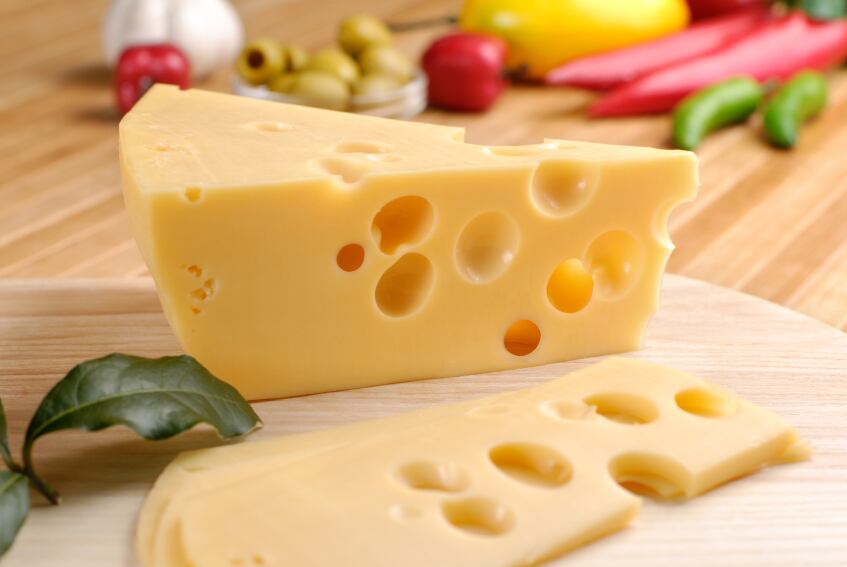In a randomised, crossover design study, researchers con-curd that when adults consumed a high sodium diet, they also experienced blood vessel dysfunction.
But, when the same adults consumed four servings of cheese a day alongside the same high sodium diet, they did not experience this effect.
Billie Alba, who led the study while finishing her Ph.D. at Penn State, said the findings may help people Caerphilly balance food that tastes good with minimising the risks that come with eating too much salt.
"While there's a big push to reduce dietary sodium, for a lot of people it's difficult," Alba said. "Possibly being able to incorporate more dairy products, like cheese, could be an alternative strategy to reduce cardiovascular risk and improve vessel health without necessarily reducing total sodium."
While sodium is a mineral that is vital to the human body in small doses, too much dietary sodium is associated with cardiovascular risk factors like high blood pressure so WHO recommends an intake of less than 5,000 mg of salt per day.
According to Lacy Alexander, professor of kinesiology at Penn State and another researcher on the study, previous research has shown a connection between dairy products - even cheeses high in sodium - and improved heart health measures.
"Studies have shown that people who consume the recommended number of dairy servings each day typically have lower blood pressure and better cardiovascular health in general," Alexander said.
"We wanted to look at those connections more closely as well as explore some of the precise mechanisms by which cheese, a dairy product, may affect heart health."
Method
The researchers recruited 11 adults without salt-sensitive blood pressure for the study. They each followed four separate diets for eight days at a time: a low-sodium, no-dairy diet; a low-sodium, high-cheese diet; a high-sodium, no-dairy diet; and a high-sodium, high-cheese diet.
The low sodium diets had participants consume 1,500 mg of salt a day, while the participants consuming high sodium diets had to consume 5,500 mg per day. The cheese diets included 170 grams, or about four servings, of several different types of cheese a day.
At the end of each week-long diet, the participants returned to the lab for testing. The researchers inserted tiny fibers under the participants' skin and applied a small amount of the drug acetylcholine, a compound that signals blood vessels to relax. By examining how each participants' blood vessels reacted to the drug, the researchers were able to measure blood vessel function.
The participants also underwent blood pressure monitoring and provided a urine sample to ensure they had been consuming the correct amount of salt throughout the week.
Results
The researchers found that after a week on the high sodium, no cheese diet, the participants' blood vessels did not respond as brie-lliantly to the acetylcholine and had a more difficult time relaxing. But this was not seen after the high sodium, high cheese diet.
"While the participants were on the high-sodium diet without any cheese, we saw their blood vessel function dip to what you would typically see in someone with pretty advanced cardiovascular risk factors," Alexander said. "But when they consumed the same amount of salt, and ate cheese as a source of that salt, those effects were completely avoided."
Alba said that while the researchers cannot be sure that the effects are caused by any one specific nutrient in cheese, the data suggests that antioxidants in cheese may be a contributing factor.
"Consuming high amounts of sodium causes an increase in molecules that are harmful to blood vessel health and overall heart health," Alba said. "There is scientific evidence that dairy-based nutrients, specifically peptides generated during the digestion of dairy proteins, have beneficial antioxidant properties, meaning that they have the ability to scavenge these oxidant molecules and thereby protect against their damaging physiological effects."
Alba said that in the future, it will be Gouda to study these effects in larger studies, as well as further research possible mechanisms by which dairy foods may preserve vascular health.
Cheese studies
The potential health benefits of vitamin K include cardiovascular and bone health and MK-7, MK-8, and MK-9 are found in fermented food products like cheese. A recent study by scientists from Belgium and The Netherlands, published in the Journal of the American Heart Association, found that improving vitamin K status may boost cardiovascular health by reducing arterial stiffness and improving blood pressure.
Researchers from the University of Florence previously found that consuming cheese from ewe’s milk, rich in conjugated linoleic acid (CLA), may reduce markers linked to heart disease.
They said ewe’s milk rich in cis-9, trans-11 CLA produced favourable changes in inflammatory cytokines and platelet aggregation, both of which are associated with atherosclerosis, or hardening of the arteries due to the build-up of fatty deposits on artery walls.
Source: The Journal of Nutrition
Authors: Billie K Alba et al,
"Controlled Feeding of an 8-d, High-Dairy Cheese Diet Prevents Sodium-Induced Endothelial Dysfunction in the Cutaneous Microcirculation of Healthy, Older Adults through Reductions in Superoxide"


